$PROMPT Airdrop Meant to Be Distributed for Free was Front-Run for 120 ETH by MEV, Community Suspects Programmer Used AI to Write the Contract
The AI Agent platform Wayfinder, under Parallel, was thrust into the spotlight today, joining the likes of the previously hot Kaito and the Sign-backed token distribution platform TokenTable in the whirlwind. What exactly transpired during this period.
Today is the day Wayfinder started airdropping the $PROMPT token. After launch, it has successfully been listed on OKX and CoinBase, and launched perpetual contracts on Binance. However, the process of claiming the airdropped tokens did not go smoothly. Many users reported that after interacting, the page showed the tokens were claimed, but they did not receive the airdrop. At the same time, some individuals ended up "snagging" over 120 ETH (around $189,000) through this airdrop. What exactly happened here?

Parallel is a gaming company funded with $85 million by lead investors such as Solana Venture, Base, and Amber Group. It has developed an AI-driven survival simulation game called Colony. The protagonist of this article, Wayfinder, is used to connect the AI game Colony with blockchain and various use cases outside of gaming environments.
This TGE had three parts conducted together: Caching Rewards (staking $PRIME), APP Usage Rewards, and KAITO Rewards. However, issues arose during the KAITO airdrop claim process.
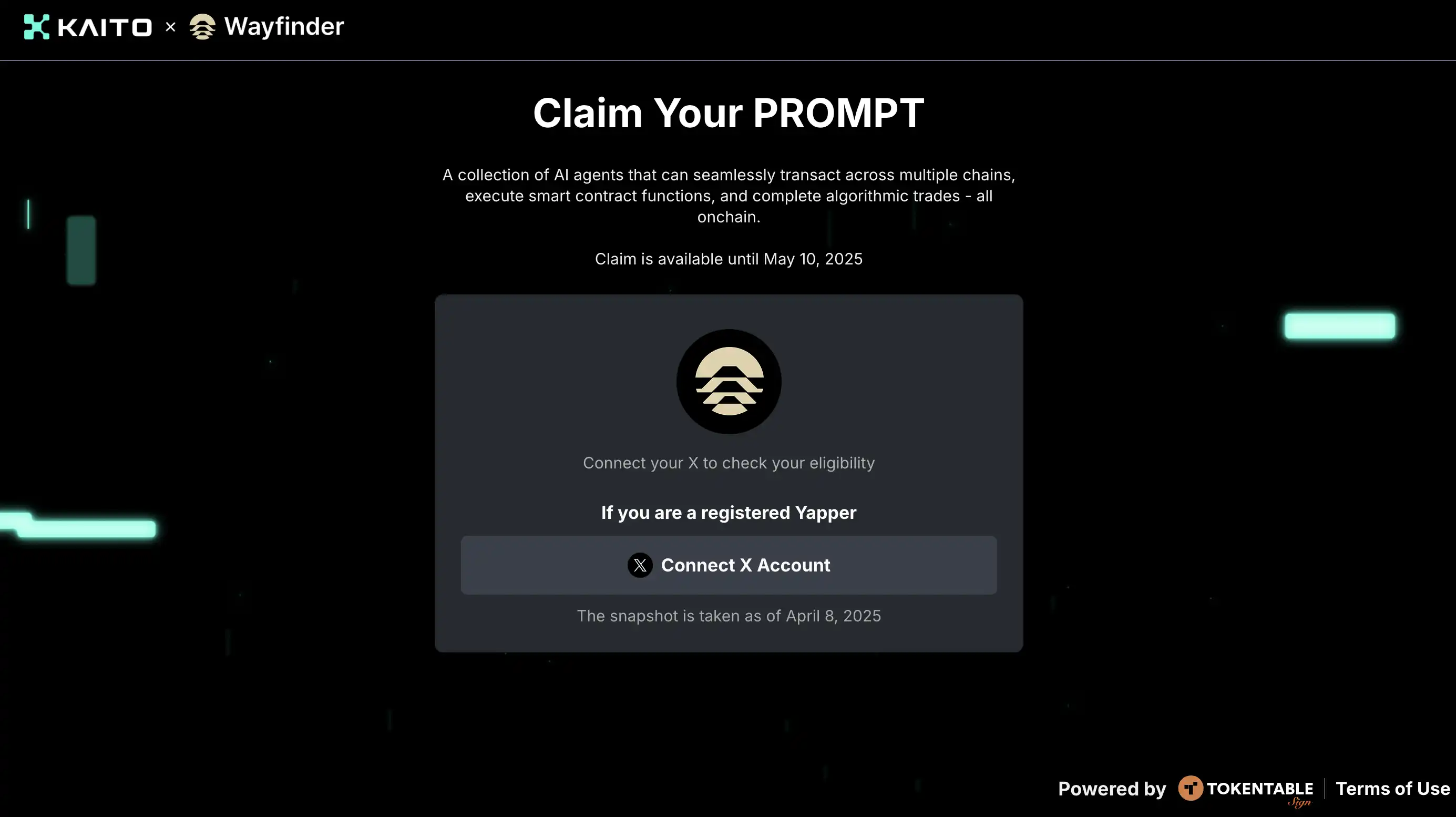
KAITO and WayFinder Airdrop "Yoinked"
Event Cause
The plan for the KAITO and Wayfinder airdrop event was to distribute 5 million tokens to Yappers, with Yap scores exceeding 90 allocated 4 million tokens, and those with scores below 90 but above 0 allocated 1 million tokens. As the event unfolded, Yappers began claiming their tokens. However, issues soon surfaced as many users on the Discord channel reported that they did not receive the tokens after interacting, although it showed that their tokens had been claimed.
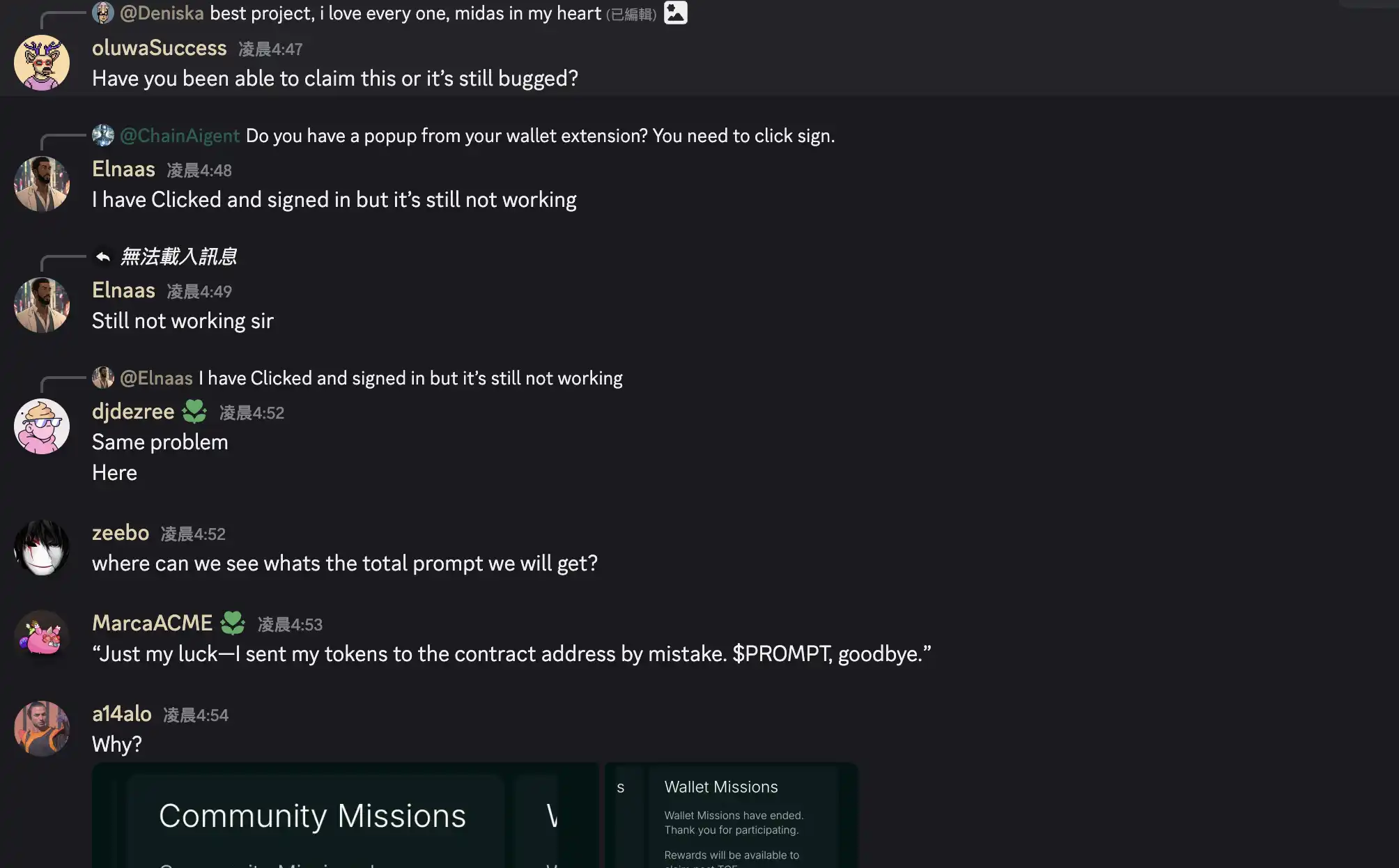
Just as everyone was puzzled, developer Ultra called out to Wayfinder on the social platform X, indicating that an MEV frontrunner was stealing the $PROMPT exchanged on the KAITO event page and converting it to ETH. He even joked that the reason he noticed it so quickly was that he had also been "Yoinked."
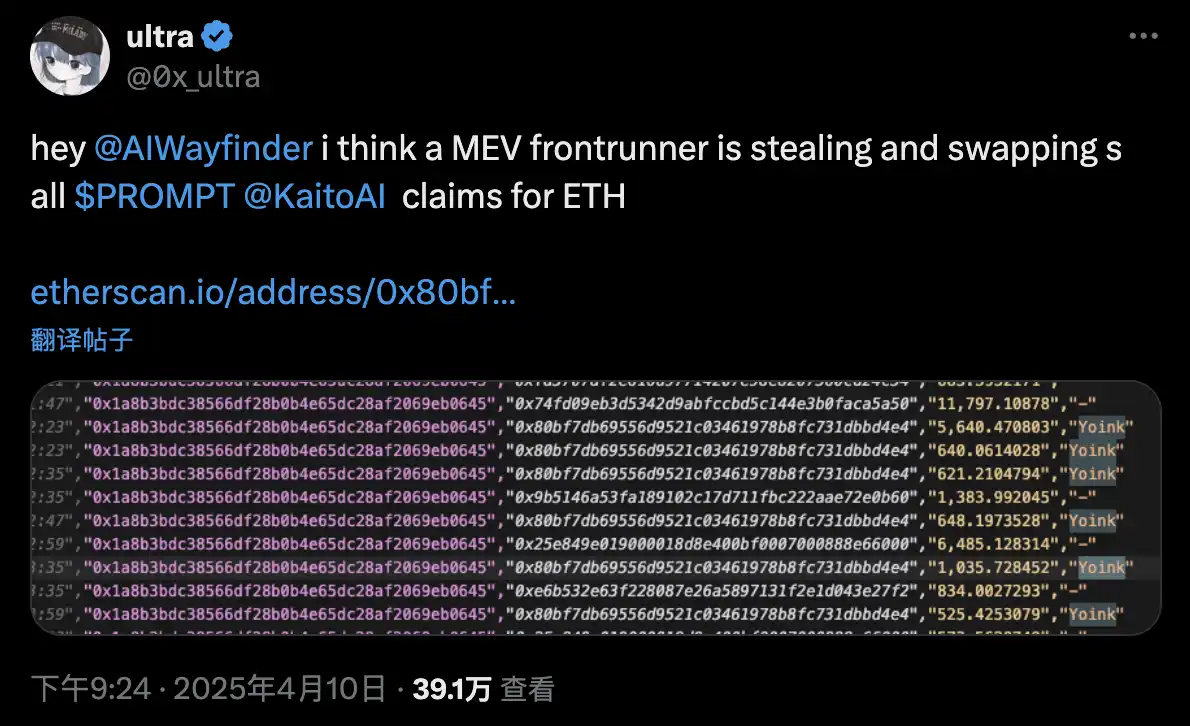
Yoink is a slang term that means "quickly snatch" or "steal," which emerged during DeFi Summer and has been widely used. MEV Frontrunner Yoink usually refers to a specific MEV bot or strategy that specializes in "snatching" other users' transaction opportunities through frontrunning.
Now, the EtherScan-verified MEV Frontrunner Yoink address is linked to a social media account X under the username yoink6980. Previously, yoink6980 gained recognition within the community for disclosing a real-world attack as an early frontrunner of a vulnerability in the ERC-2771 protocol, which safeguarded the community's funds. For example, in December 2022, they rescued funds from DFX Finance and returned them to users.
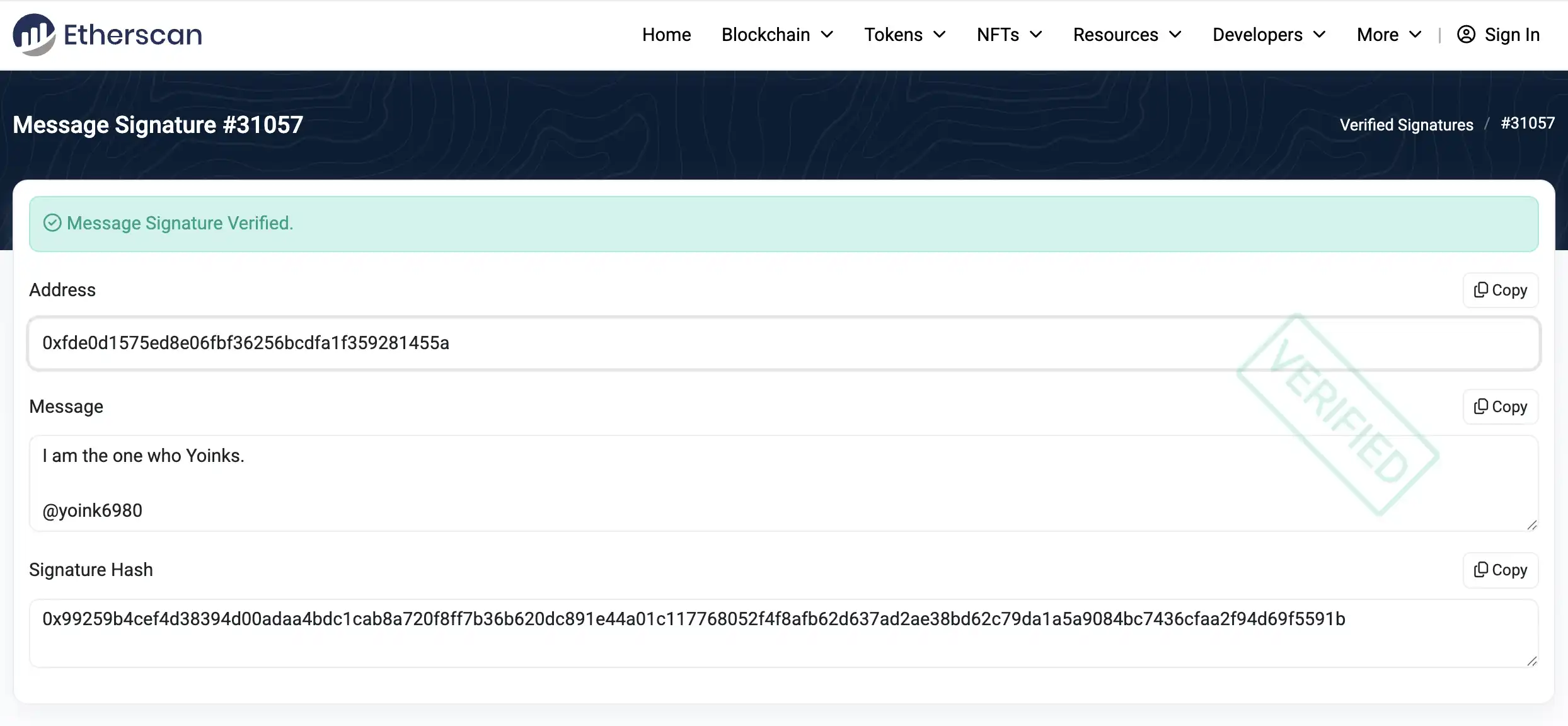
However, the individual who lost 120 ETH in this recent theft fell victim to an MEV frontrunning attack using the "Yoink" method. The intent, in this case, seems to be actual plundering rather than protecting the user.
Developer Ultra "0x_ultra" provided a postmortem, stating, "What happened today was that Kaito Yappers' AI Wayfinder claim contract was misconfigured, and the airdrop receiver was not preconfigured in the Merkle proof, allowing MEV Yoink to identify an opportunity in the mempool and act quickly, exploiting the vulnerability to frontrun any slow token claims."
Whose fault is this, ultimately?
Since then, "I get yoinked" and "Bro was lucky not to get yoinked" have become the most shared phrases on social media among users who either missed out on or received the airdrop during the WayFinder and KAITO event.
Team member Kalos made an announcement stating, "The issue with Kaito's airdrop token claim is not on our end, but we are working with them to resolve it," and specifically mentioned, "and the contract was not created by Wayfinder." Within the community, there has been increasing FUD regarding this matter, with questions arising as to whether the claiming contract was not audited at all or simply written by AI.
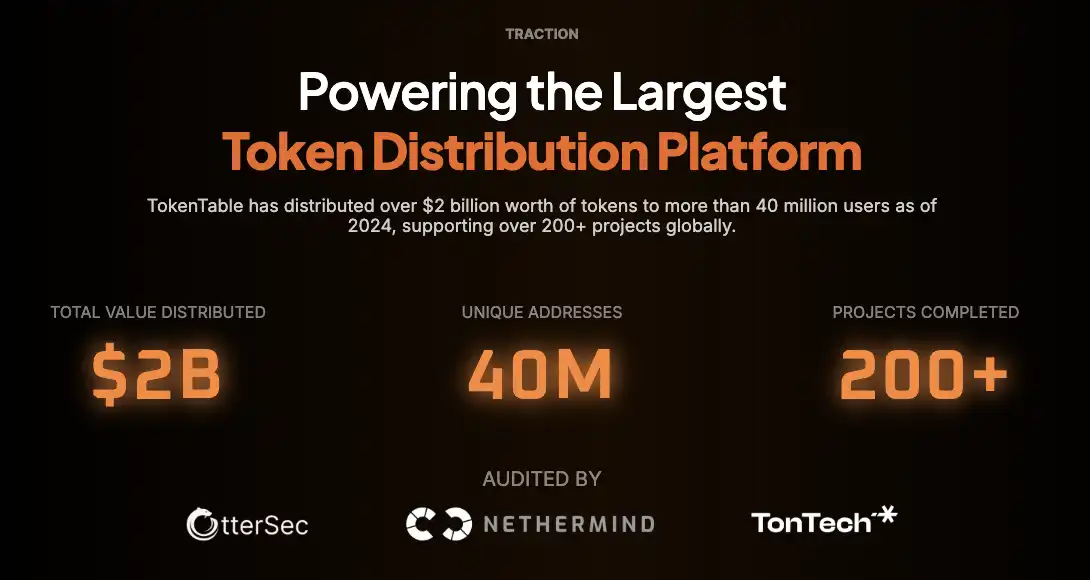
The technical support platform TokenTable responsible for the KAITO airdrop also quickly responded, stating that this event will not affect other Wayfinder airdrops or any other TokenTable airdrops. They will compensate for the losses of all users who did not receive tokens in this airdrop due to MEV impact, including all failed transaction fees, which will be refunded in ETH. They mentioned that the smart contract has no issues, and MEV is the fundamental problem. From the official website, we can see that TokenTable's contract was audited by auditing companies such as tteSec, Nethermind, and TonTech.
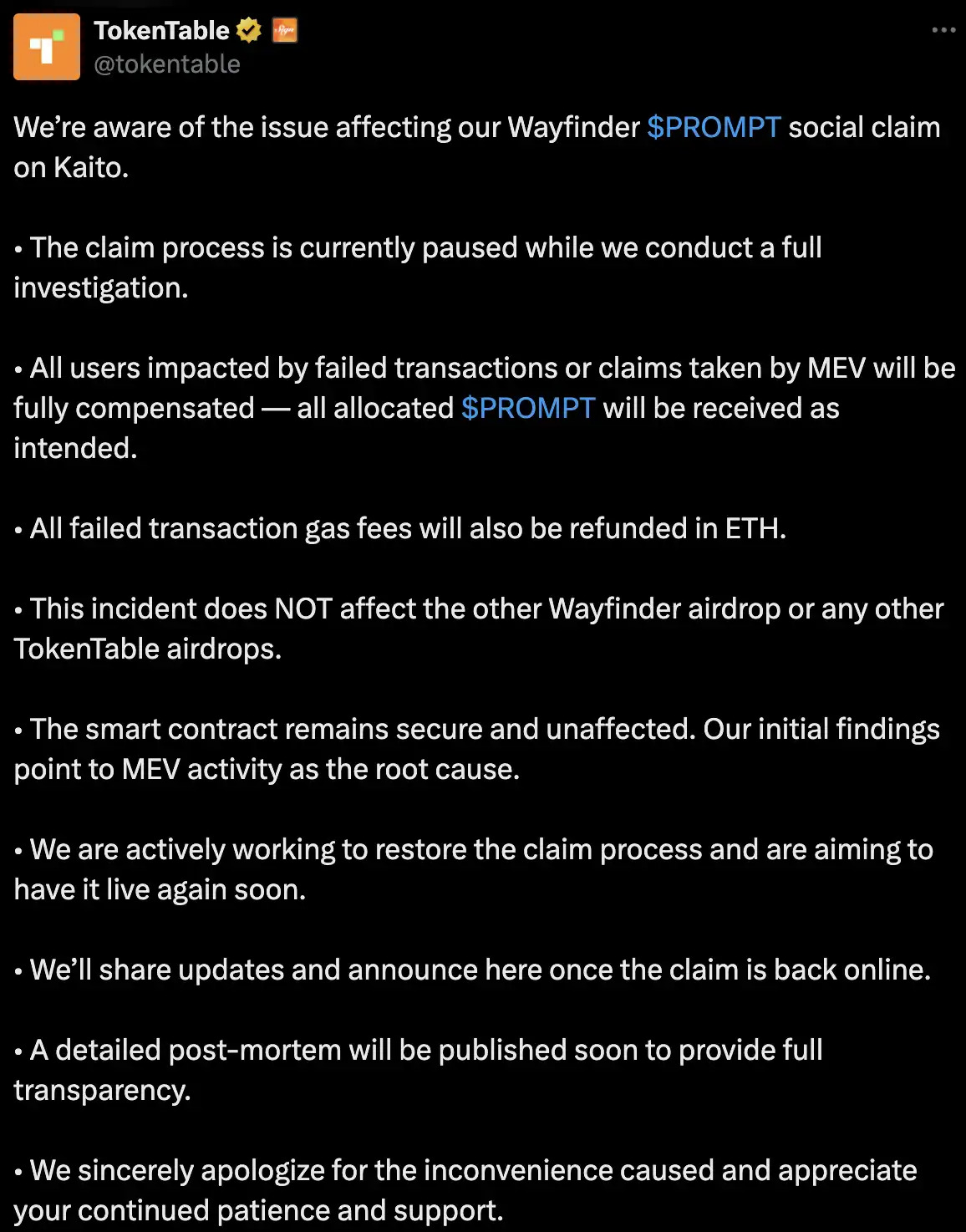
The founder of g8keep, PopPunk, posted a comment on social media X regarding this event, saying, "I warned you all a long time ago!" In fact, the day before the airdrop, he had already posted on X mocking some issues in Wayfinder's claiming contract, believing that storing each individual claim on-chain mapping instead of using a Merkle root was a very bad practice.
Wayfinder team member Kalos had responded to this tweet, saying, "The smart contract was audited by Quantstamp and other companies, and we have done multiple Merkle roots. It may have saved us some gas, but mapping is better for users." PopPunk expressed his confusion as to why mapping would be better for users unless they were claiming the airdrop directly from the contract rather than the website.
Although this event may not have been caused by Wayfinder's "Caching" claim contract issue, some community members pointed out that the Merkle root contract design could indeed reduce Yoink risk. For example, requiring users to submit a unique "binding address" as proof or limiting single claim windows could increase the difficulty of bot replication transactions. Off-chain Proof distribution can be combined with private transaction pools such as Flashbots to hide mempool visibility, reducing monitoring opportunities.
Based on the current evidence, TokenTable may have taken on a greater responsibility in this event, but we do not yet know specifically which party's error it belongs to and are awaiting further investigation reports. However, it is fortunate that TokenTable is willing to take responsibility for this, ensuring that users will not incur any losses.
Another Incident Amidst the Turmoil: Stakers' Complaints
$PRIME Three-Year Stakers Suffer Heavy Losses
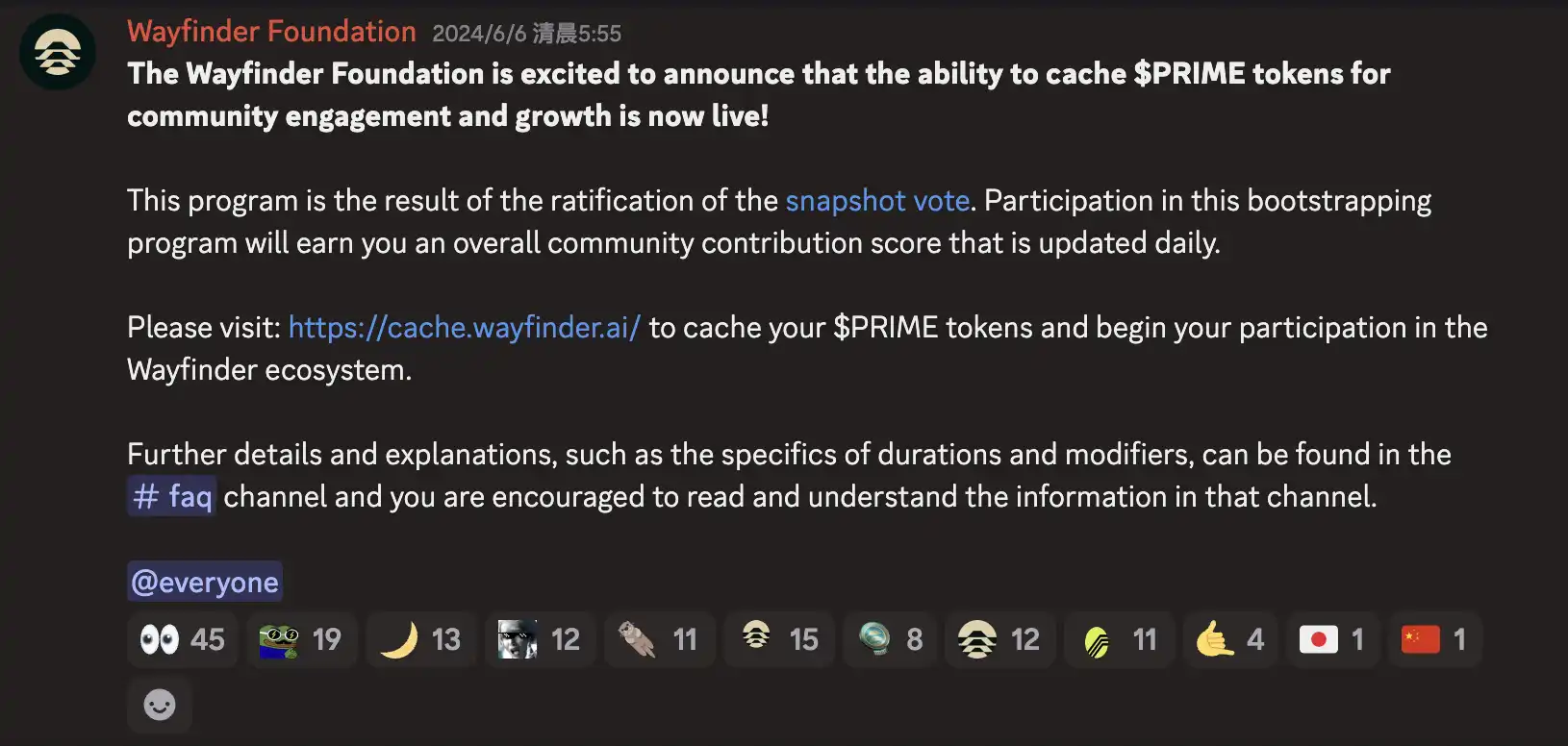
In June 2024, Wayfinder announced an event where staking $PRIME would give participants the opportunity to join the Wayfinder "Future Airdrop," with rewards increasing based on the length of your stake, up to a maximum of three years.
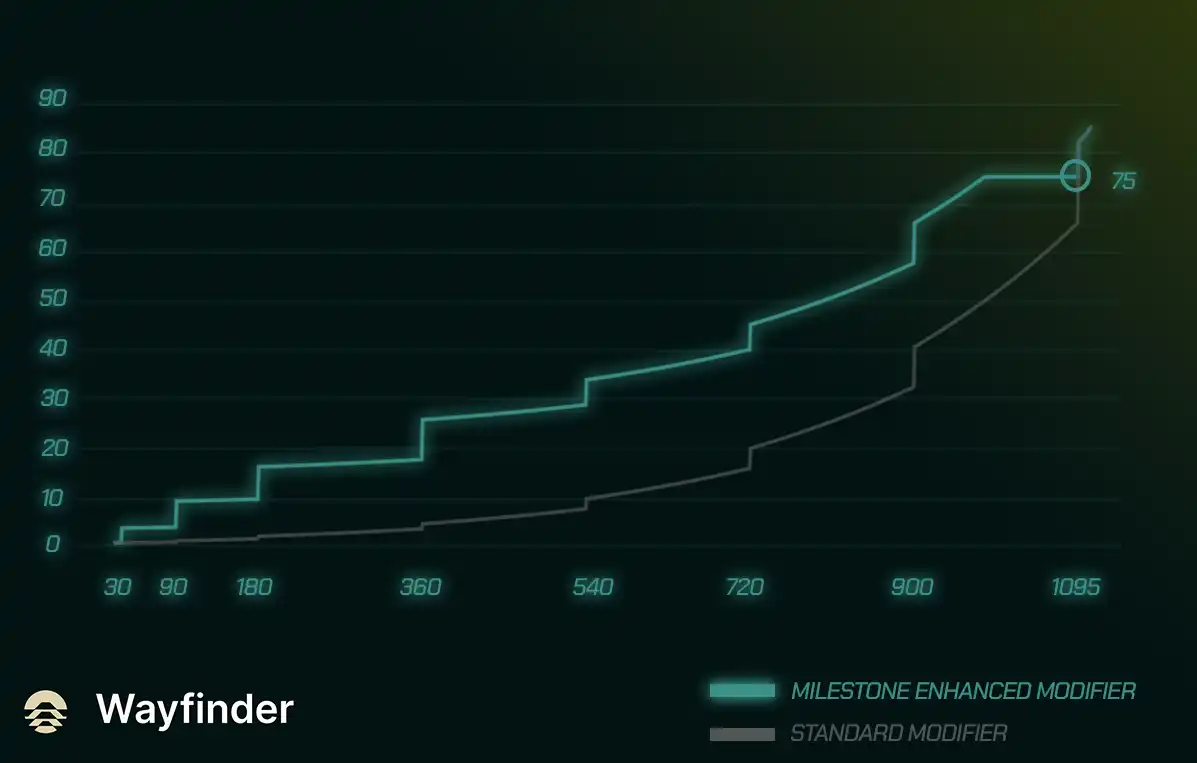
The resolution of Kaito's and WayFinder's airdrop distribution has now led to dissatisfaction among those who initially staked $PRIME to become Cache users. One community member, Lsi-luna, who participated in the event, expressed his frustration on Discord, stating, "Even though I received a portion of this airdrop, considering the significant drop in $PRIME's price, I only received 2% of what I put in."

Amidst such allocation imbalances, do we still need to engage with the community?
This situation has occurred numerous times in many blockchain projects. However, what truly dismayed the community was the journey from staking $50,000 worth of $PRIME in January to only receiving $200 now, while merely using Binance's website feature once could grant $100 for free. The disregard for contributors and the generosity towards non-contributors have left them deeply aggrieved.
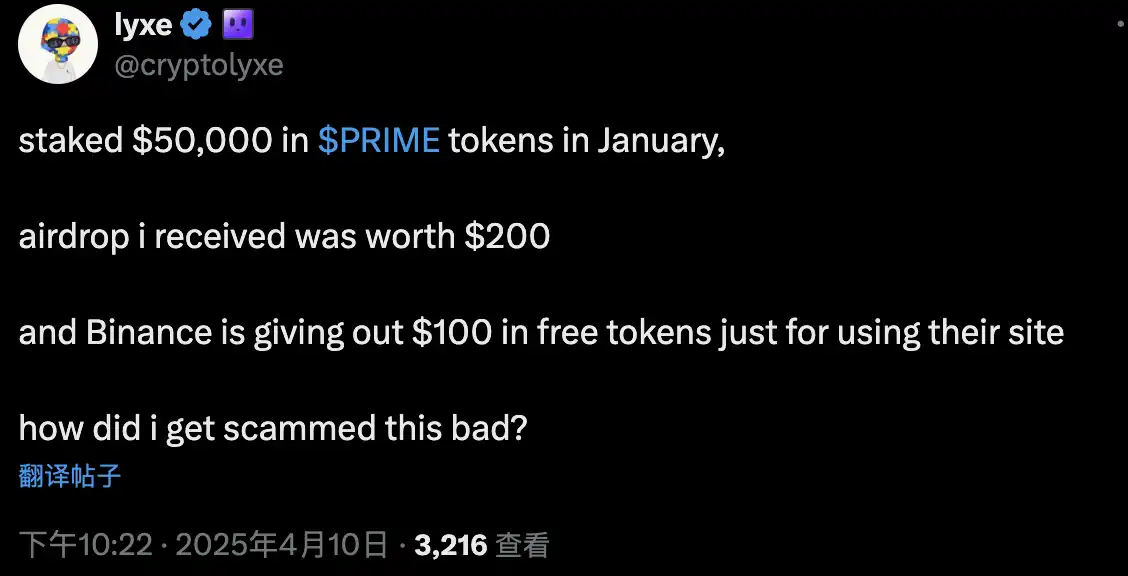
The rewards given through Kaito's event were even more significant, with multiple emerging Yappers reaping large rewards in this airdrop, ranging from thousands to nearly tens of thousands of dollars, even though they hardly paid attention to the project. Team member Kalos made a statement that Cachers would receive a total of 400 million $PROMPT tokens, with social tasks, including Kaito's plan, amounting to 20 million $PROMPT. Cachers are currently only receiving 28% of all rewards, but this does little to mend the community's hurt.
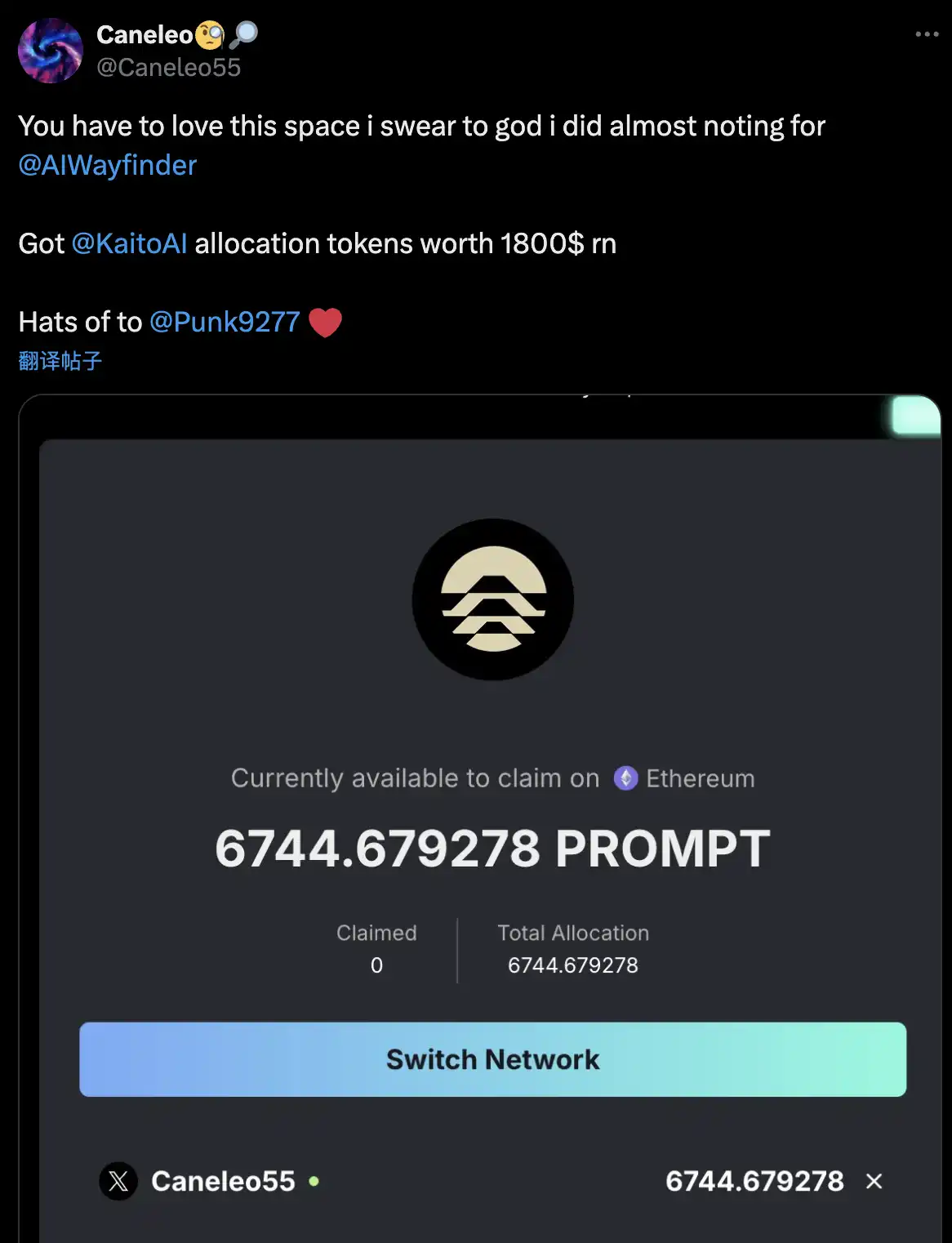
Many of those who received the airdrop could not bear to remain silent. Moonrock Capital's founder Simon mentioned in a post that he received nearly $10,000 worth of $PROMPT from Kaito and AIWayfinder's airdrop page, expressing confusion as to why AIWayfinder would reward him, even though he had barely mentioned the project himself.
Unable to contain his confusion, he continued to express his bewilderment at this phenomenon, stating, "I don't need to make any contribution, yet I can easily claim tokens, sell them, and extract value in between. Meanwhile, those who incur 100% of the costs receive no reward. I've said it before and I'll say it again now: airdrops are outdated and meaningless."
Kaito founder Yu Hu offered a friendly reminder to Simon in the comments, referring to a tweet Simon posted last month about AIWayfinder. Simon replied, "Thank you for sharing; I even forgot about that post myself. I thought we needed to keep talking about Wayfinder and share MindShare for them."

Those who staked tokens embraced risks such as price drops and the opportunity cost of waiting for a year. On the other hand, the "influential" individual posted a tweet with 28 likes a month ago, with the former receiving less than 1/10 of the rewards compared to the latter. This may be the reason behind the community's outrage.
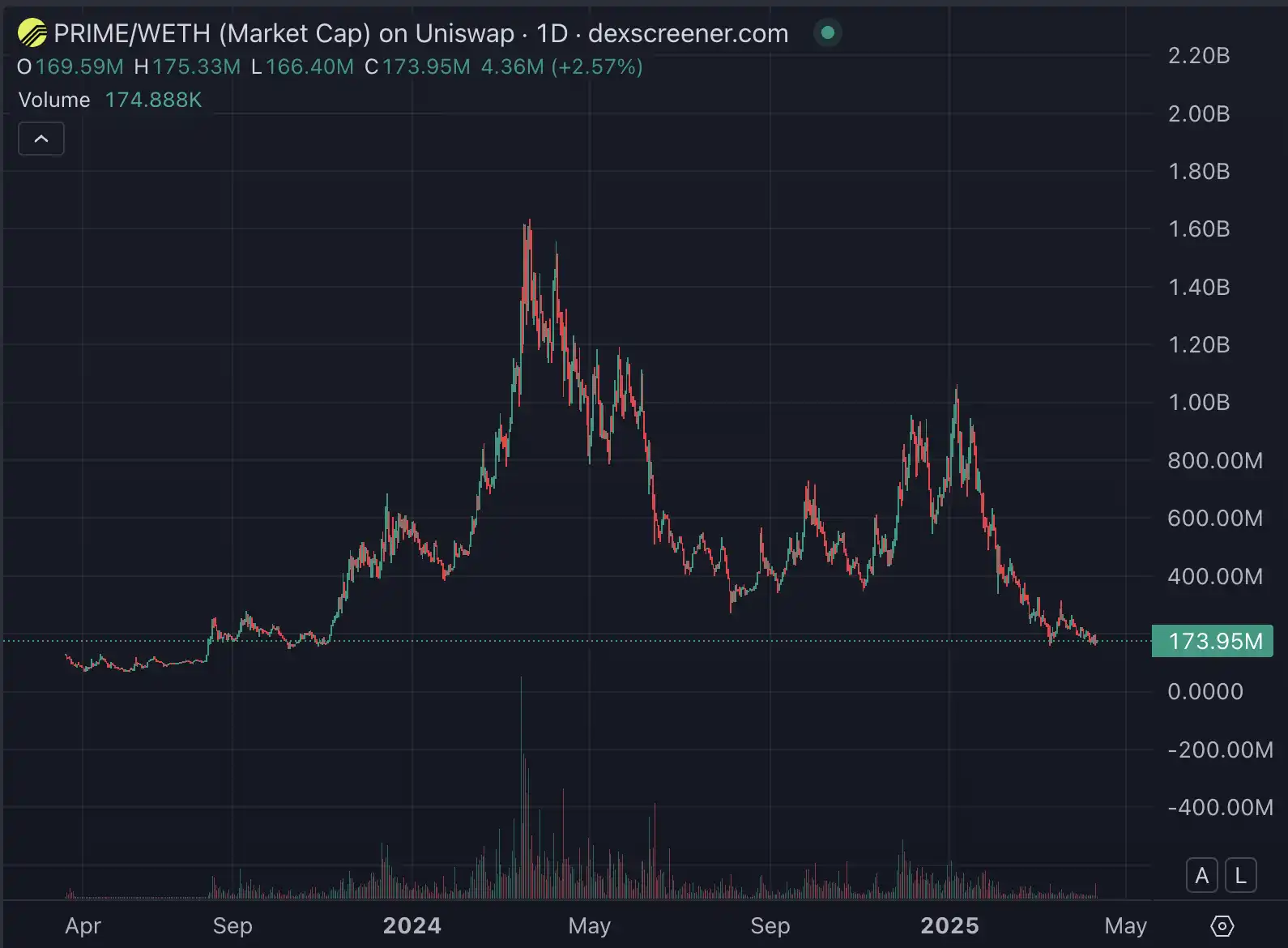
PRIME has plummeted nearly 90% from its peak $1.6 billion market cap and 75% since the June event.
In the crypto space, successfully launching a product is extremely challenging, and once tokens are involved, achieving a fair distribution of interests among all parties becomes even harder. While it remains unknown whether "airdrops" are dead, it is a consensus in the crypto world that when most projects lose the support of the community, progress becomes difficult. In the current industry landscape dominated by fast-moving Meme culture, every practitioner must grapple with how to retain project teams that want to make a real impact and how to protect community members who still "believe."
Disclaimer: The content of this article solely reflects the author's opinion and does not represent the platform in any capacity. This article is not intended to serve as a reference for making investment decisions.
You may also like
Donald Trump’s Memecoin to Face $320 Million Token Unlock as Price Dips

33% of French looking to buy crypto in 2025 but Italians are even more bullish
Share link:In this post: A third of French people intend to purchase cryptocurrencies this year. New study shows Italians as most bullish among surveyed nations in Europe. The crypto sector’s growing legitimacy helps attract more investors, researchers say.
Spanish Police End Crypto Scam Ring That Used AI to Swipe $21 Million From Investors

Survey reveals 1 in 5 Americans own crypto, with 76% reporting personal benefits

